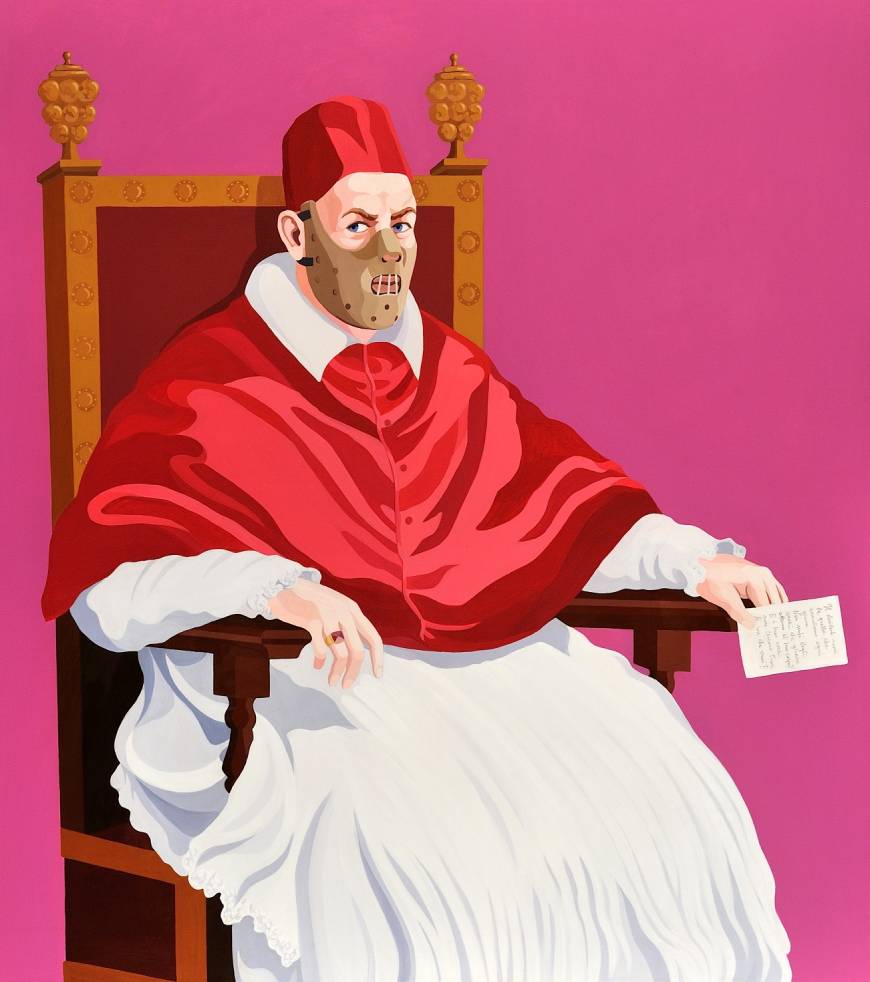Curators' Pick
Guiseppe Veneziano - May 26, 2021

Guiseppe Veneziano, Il silenzio dell’Innocenzo, 2011
To call Guiseppe Veneziano a controversial artist is an understatement. His more challenging works have garnered him fame and censorship, but often his pieces about Koons or Hitler are more stylish provocation than substance, like a child learning a new profanity. But the work I’m sharing today by Veneziano builds upon past artists whose portraits, centuries or decades later, still unsettle us. That this image is less trite and exists more so in the space where art, or art history, can be both subversive and yet direct, is why I consider it worthwhile. 𝘐𝘭 𝘴𝘪𝘭𝘦𝘯𝘻𝘪𝘰 𝘥𝘦𝘭𝘭’𝘐𝘯𝘯𝘰𝘤𝘤𝘦𝘯𝘻𝘰 (2011) appropriates Spanish painter Diego Velázquez Portrait of Pope Innocent X (c.1650), but with the addition of the ‘mouthguard’, so well known to us from Hannibal Lecter. 𝘐𝘭 𝘴𝘪𝘭𝘦𝘯𝘻𝘪𝘰 𝘥𝘦𝘭𝘭’𝘐𝘯𝘯𝘰𝘤𝘤𝘦𝘯𝘻𝘰 has more in common, perhaps, with the painting Study after Velázquez’s Portrait of Pope Innocent X (1953) by Francis Bacon. My own history brings to mind Metis artist Michel Boutin’s amusing and disturbing painting from his Great King Rabbit series: one of his ‘rabbits’ is in papal drag, looking feral, with large teeth, the better to eat you with, my dear (like the skulls of the victims that adorn his throne, with a paw richly adorned in rings, another gripping a stack of cash).
As an Italian, Veneziano is perhaps more familiar with the history of the papacy than most, and thus he offers a contemporary reimagining of the pontiff. From the swaddled self assurance of power manifest in Velazquez’s Innocent (who was a shrewd politician), or Bacon’s Pope, whom art critic Arim Zweite described as having “a sinister manner, in cavernous dungeons, afflicted by an emotional outburst and devoid of any authority”, Veneziano offers one who might consume us, alluding to a pop culture serial killer both ‘admired’ and abhorred. Veneziano might be describing the papacy itself: after all, it’s rumoured that the decadent Borgias, when one of them found themselves in the throne of St. Peter, asserted that ‘God has seen fit to give us the papacy, we must see fit to enjoy it’….~ Bart Gazzola